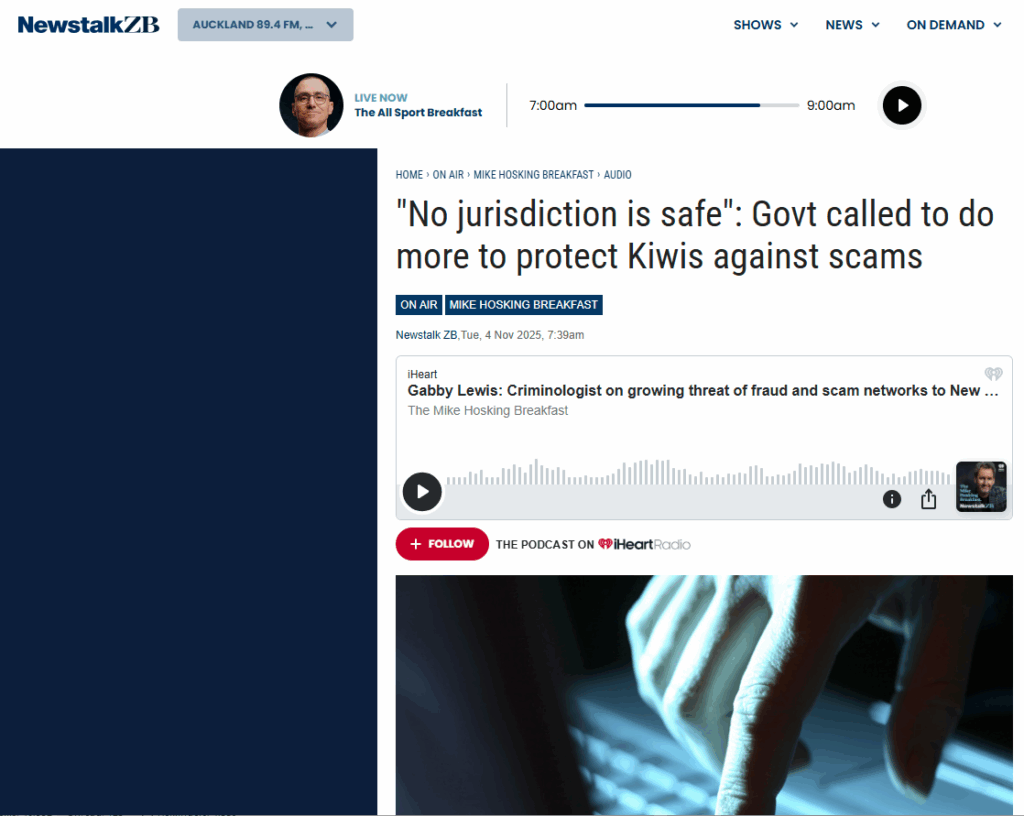Experts Warn New Zealand Falling Behind in Fight Against Cyber Crime
Calls Grow for Tougher Laws to Protect Kiwis from Organised Online Scams
New Zealand is being urged to strengthen its approach to tackling cyber crime as international syndicates continue to target local victims through social media scams, fake investment schemes and fraudulent online ads.
A visiting criminologist and digital fraud expert says the country risks becoming a soft target for organised criminal groups operating out of South East Asia unless regulation of social media platforms and telcos is tightened to match Australia’s new anti-scam laws.

Expert Calls for Stricter Regulation of Tech Platforms
Gabby Lewis, Head of Fraud and Financial Crime at Australasian digital asset exchange Swyftx and a keynote speaker at next week’s New Zealand Police Financial Intelligence Unit (FIU) Anti-Money Laundering and Countering Financing of Terrorism (AML/CFT) Conference, says scam networks have evolved into a sophisticated form of organised crime generating millions of dollars in illicit profits each week.
“There are around 400 scam compounds in the Philippines alone, each built to look like a legitimate tech firm but powered by trafficked workers forced to defraud people online,” Lewis says. “These syndicates are the new engine rooms of global organised crime, funnelling stolen money into terrorism, child exploitation and other illegal activity.”

New Zealand Cyber Crime Losses Top $1.6 Billion
According to government data, New Zealanders lost more than NZ$1.6 billion to online threats over the past year. More than 830,000 people were financially affected, with average losses of $1,260 per attack. A majority of victims reported moderate to severe emotional and financial harm.
“The human cost of cyber crime is enormous,” Lewis says. “We speak to people who have lost their savings, homes and relationships. The shame and distress are often as damaging as the financial loss itself.”
Most scams begin on social media, where fake investment or romance profiles lure victims into transferring funds to offshore accounts. “These scams often start with deceptive ads on Facebook or Google,” Lewis says. “By the time they reach a digital asset exchange, the damage has already been done.”
Australia Leads with World’s Strongest Anti-Scam Laws
Lewis says New Zealand should follow the examples set by Australia and the United Kingdom, where new frameworks require banks, telcos and social media companies to share responsibility for detecting and blocking fraudulent activity.
Australia’s recently enacted Scams Prevention Framework imposes mandatory minimum standards across industries and includes penalties of up to A$50 million for organisations that fail to take reasonable preventative action. The rules require banks to verify payees, telcos to block scam texts and calls, and online platforms to remove fraudulent advertisements.
The Australian Government describes the framework as the world’s strongest anti-scam law. According to the Australian Competition and Consumer Commission, reported losses fell 13 percent in 2023 following the crackdown — a clear sign that strong, coordinated policy works. (ACCC source)
“In Australia, social media platforms and telcos are being held accountable for vetting advertisers and removing fake investment ads,” Lewis says. “New Zealand must act before these networks shift their focus here.”
Education Key to Reducing Cyber Crime Victimisation
Lewis highlights Swyftx’s own prevention initiative — a pilot programme rewarding users for learning to identify scams. Participants received a $10 incentive for completing a 15-minute online training and enabling two-factor authentication. “Those who took part were 62 percent less likely to fall victim to scams and 55 percent less likely to disable security protections later,” she says.
The model, she argues, could be replicated across banking and telecommunications sectors. “Rewarding customers for learning about scams is not just socially responsible, it’s commercially smart. When people understand how fraudsters operate, they make safer choices.”
National Education Campaign Needed
Lewis says public awareness campaigns are crucial to tackling cyber crime at scale. “We need a unified, memorable message — something like ‘Slow Down. Look Around. Shut It Down.’ If every Kiwi heard that same slogan from their bank, telco and exchange, the message would finally stick.”
Her comments come ahead of her presentation at the 2025 FIU/ACAMS Conference, where she will call for tighter cross-sector collaboration to stop scam syndicates from taking a deeper hold in New Zealand.
Media and Industry Response
The story has already gained widespread attention, featuring across 1News, NZ Herald and Stuff, reflecting the growing national concern over online security and scam prevention. Industry leaders are echoing Lewis’s warning that fragmented regulation leaves consumers dangerously exposed.
About Impact PR
Impact PR is one of the top PR agencies new zealand businesses turn to for communications strategy in the technology and financial sectors. The agency has delivered campaigns for fintech, cybersecurity and banking clients focused on public education and consumer protection. With expertise in crisis management and media relations, Impact PR helps brands build trust and credibility through transparent, proactive storytelling that addresses emerging risks in the digital economy.
